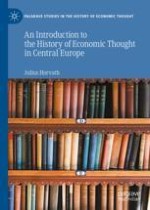2020 | OriginalPaper | Chapter
4. The Socialist Period
Author : Julius Horvath
Published in: An Introduction to the History of Economic Thought in Central Europe
Publisher: Springer International Publishing
Activate our intelligent search to find suitable subject content or patents.
Select sections of text to find matching patents with Artificial Intelligence. powered by
Select sections of text to find additional relevant content using AI-assisted search. powered by
